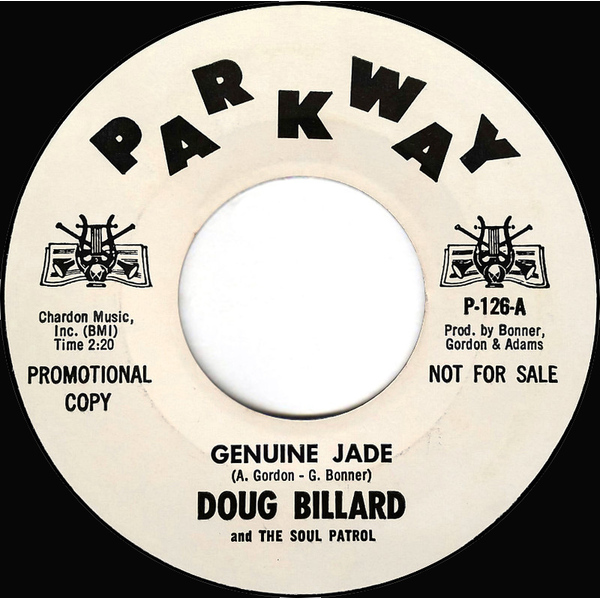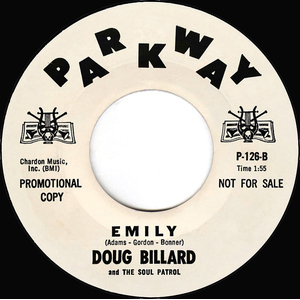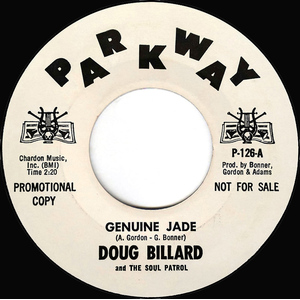Information/Write-up
Doug Billard: Soul Voice of the Maritimes
Doug Billard was one of the most distinctive vocalists to emerge from Nova Scotia’s vibrant music scene during the 1960s and 1970s. A commanding frontman with deep soul roots and progressive rock instincts, Billard left an indelible mark on multiple East Coast groups—fronting everything from R&B outfits to psych-rock trailblazers. Though never a major commercial star, his influence rippled across the Canadian musical landscape through a string of powerful recordings and live performances that showcased his vocal range, stage charisma, and versatility.
Early Career: Soul Patrol, Beavers, and The Five Sounds
Doug Billard’s recording career began in 1966 when he fronted the short-lived but dynamic Doug Billard and The Soul Patrol. That year, he released his debut single, “Genuine Jade” b/w “Emily”, on Parkway Records (P-126, USA). The record combined sophisticated orchestration with a gritty vocal delivery and established Billard as a potent new presence in the Halifax R&B scene.
Shortly afterward, he joined The Beavers, another Halifax-based group who were riding the wave of British Invasion-inspired garage rock. He soon transitioned into The Five Sounds, a versatile and high-energy R&B/garage outfit that would become his most widely distributed early project. The Five Sounds released two singles:
“Loadin’ Coal” / “Baby, Please Don’t Cry” on Epic Records (USA) – A hard-grooving number featuring Billard’s powerful vocals. Epic’s own internal promo later called the record “too strong to pass up,” citing it as a “lost gem” that deserved a second push.
“Peanut Butter” / “Miss Ann” – A fuzz-drenched, independently released single that further showcased the group’s garage leanings and tight, energetic delivery.
During this time, Billard gained a reputation as one of the finest soul-influenced vocalists in the Maritimes. His voice, shaped equally by American R&B and Canadian rock, lent a unique emotional weight to everything he performed.
Central Nervous System and Psych-Rock Evolution
In the late 1960s, Billard joined the Halifax-based progressive rock band Central Nervous System, an experimental horn-driven collective that blended jazz, soul, blues, and psychedelia into a fierce live act. Though their recordings are scarce, the band’s performances left a strong impression and marked a stylistic shift for Billard toward more exploratory musical territory.
Pepper Tree and National Breakthrough (1968–1970)
Billard’s highest-profile band role came when he joined Pepper Tree in 1968, replacing founding vocalist Bonnie Oulton. The group—already gaining local attention for their psychedelic sound—was now centered around Billard’s powerful lead vocals, the melodic keyboards of Bob Quinn, and the rhythm section of Tim Garagan, Ritchie Richmond, and Lenny Brennan.
In 1969, this lineup recorded several songs for a CBC split album with American pop singer Bobby Arvon, including “The Gypsy”, which featured guest vocals by Penny MacAuley. The tracks gave a glimpse into the band’s evolving sound: organ-heavy rock with progressive flourishes and tight vocal harmonies.
In 1970, Pepper Tree signed with Capitol Records and released their debut single “Everywhere” / “Mr. Pride” (Capitol 72612). All five members—including Billard—were credited as songwriters. The single was promoted heavily by Capitol, charted in the RPM 100, and eventually reached the Top 20 nationally (RPM, June 6 & 13, 1970). DJs and RPM staff favored the B-side, “Mr. Pride,” which gained traction across the country. According to RPM Weekly (July 18, 1970):
“The Halifax Pepper Tree... have broken nationally and now move into the No. 13 position on the RPM 100 Singles chart… observers who were fortunate enough to attend any of the sessions were literally flabbergasted.”
Despite the success, Billard left the group shortly after the release. His replacement would go on to sing on Pepper Tree’s You’re My People LP, but Billard’s contributions helped lay the foundation for the band’s Capitol era.
Canadian Rock Theatre and Theatrical Reinvention (1972)
In 1972, Billard joined the ambitious touring project Canadian Rock Theatre, a rock opera-style stage show and LP featuring a rotating cast of top Canadian musicians. Produced by Marty Simon and released via Nimbus 9, the production fused storytelling, politics, and powerful vocal performances.
Billard appears prominently on the album, adding theatrical flair to his vocal delivery. His performances were among the highlights of the record, and he held his own beside more established performers from the Canadian rock and theatre scenes.
Solo Career and Lighthouse (1973–1978)
In the fall of 1973, Doug Billard briefly replaced Bob McBride as lead vocalist in the legendary Toronto horn-rock band Lighthouse. Although his time with the group was short and did not result in official recordings, his selection for such a high-profile role is a testament to his stature as one of Canada’s premier rock and soul voices.
Between 1974 and 1978, Billard pursued a solo career, releasing two singles:
“I’ve Lost My Place” / “Don’t Fight the Feeling” (United Artists UAXW 572X, 1974) – A soulful, mid-tempo track that earned regional airplay and critical praise for its emotive delivery.
“Baby Come and Dance” / “Sweet Sweet Love” (Epic E4-8261, 1978) – A more groove-oriented release that reflected the era’s pop-soul stylings.
While neither charted nationally, both have since gained cult status among Canadian collectors and fans of Maritime pop-rock.
Legacy
Doug Billard’s career “spanned the continent,” as RPM Weekly noted in a retrospective mention (Feb. 24, 1973). Whether fronting a barroom R&B act, co-writing psych-rock tracks for Capitol Records, belting musical theatre in Canadian Rock Theatre, or stepping into the spotlight with Lighthouse, he consistently delivered passionate, professional, and unforgettable performances.
While much of his work remains underrecognized outside collector and historian circles, Doug Billard’s discography paints a vivid portrait of a gifted, hard-working Canadian vocalist navigating a dynamic and evolving music scene. His story is integral to the history of Atlantic Canadian rock—and worthy of deeper rediscovery.
-Robert Williston



No Comments